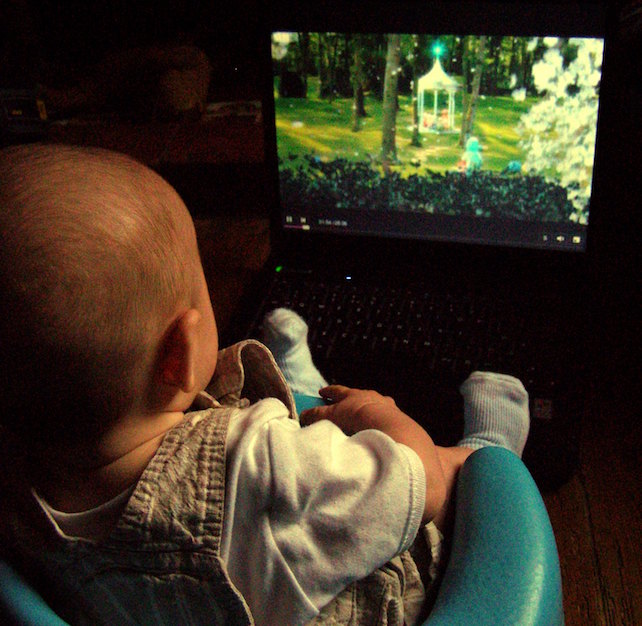ARTICLE AD
Screens can seem like a cheat code for parenting, offering a brief respite from shrill noises and surrealist mischief long enough to do something indulgent like wash dishes or make lunch.
Yet while screen time may be harmless or even enriching in moderation, it's still rife with pitfalls. Screens can tempt kids away from physical activity and imaginative play, for example, and could stunt development of critical skills like emotional self-regulation if overused.
According to a new study, screen time for babies and toddlers is also linked to an additional risk many parents may not have considered: developing atypical sensory-processing behaviors.
Kids who spent more time watching TV or other videos before age 2 were more likely to develop these atypical behaviors before age 3, the study's authors report, and the likelihood seems to increase with more screen time per day.
The behaviors include "sensation seeking" and "sensation avoiding" – when a child seeks out more intense sensory stimulation or is more averse to intense sensations, respectively – as well as "low registration," a lower sensitivity or slower response to stimuli.
Behaviors like these can offer clues about a child's sensory-processing skills, or their body's ability to interpret sensory input and produce an appropriate response, the researchers note.
The study used data from the US National Children's Study, an incomplete large-scale cohort study designed to investigate environmental influences on child health and development.
Although the US National Institutes of Health canceled the NCS earlier than planned in 2014, data had already been collected from about 5,000 children, the authors of the new study note.
That includes data about the screen exposure of babies and toddlers at ages 12, 18, and 24 months, many of whose parents or caregivers also later completed the Infant/Toddler Sensory Profile, a questionnaire designed to shed light on small kids' sensory-processing skills.
The ITSP can help reveal patterns of low registration or sensation seeking, scoring children as either low, typical, or high based on their frequency of various sensory-related behaviors.
Caregivers were asked at 12 months old, "Does your child watch TV and/or DVDs?," while the question expanded at 18 and 24 months: "Over the past 30 days, on average, how many hours per day did your child watch TV and/or DVDs?"
The new study was based on responses from caregivers of 1,471 children recorded between 2011 and 2014.
For 1-year-olds, any screen time during their first year – as opposed to none at all – was associated with a 105 percent higher likelihood of later displaying high instead of typical sensory behaviors related to low registration at 33 months.
 (Jim Champion/Flickr)
(Jim Champion/Flickr)For 18-month-olds, each additional hour of screen time per day was associated with a 23 percent higher chance of later exhibiting high sensory behaviors related to sensation avoiding and low registration by 33 months.
And among 2-year-olds, every extra hour of daily screen time was associated with a 20 percent higher likelihood of high sensation seeking, sensory sensitivity, and sensation avoiding within the following year, the study found.
Having controlled for many other factors – such as age, health history, caregiver education, and how often a child plays or walks with caregivers – the researchers say their findings point to screen time as a significant factor, although more research is still needed to determine if there is any causal relationship.
Given the links found in this study, its authors say these atypical sensory-processing behaviors may belong in the crowded field of health concerns linked to screen time for small kids, including sleep trouble, language delay, behavioral problems, and autism spectrum disorder.
"This association could have important implications for attention deficit hyperactivity disorder and autism, as atypical sensory processing is much more prevalent in these populations," says Drexel University psychiatrist Karen Heffler.
"Repetitive behavior, such as that seen in autism spectrum disorder, is highly correlated with atypical sensory processing," Heffler says. "Future work may determine whether early life screen time could fuel the sensory brain hyperconnectivity seen in autism spectrum disorders, such as heightened brain responses to sensory stimulation."
In kids with ASD, atypical sensory processing has been linked to hyperactivity, irritability, social difficulties, and other potentially problematic behaviors. Previous research also links it with issues including anxiety and impaired executive function in kids with ADHD.
"Considering this link between high screen time and a growing list of developmental and behavioral problems, it may be beneficial for toddlers exhibiting these symptoms to undergo a period of screen time reduction, along with sensory-processing practices delivered by occupational therapists," Heffler says.
Many experts already suggest avoiding screens before age 2, with exceptions for live video chats, and limiting it to about an hour per day for ages 2 to 5.
"Parent training and education are key to minimizing, or hopefully even avoiding, screen time in children younger than two years," says Drexel University psychiatrist David Bennett.
The study was published in JAMA Pediatrics.

 1 year ago
101
1 year ago
101 

